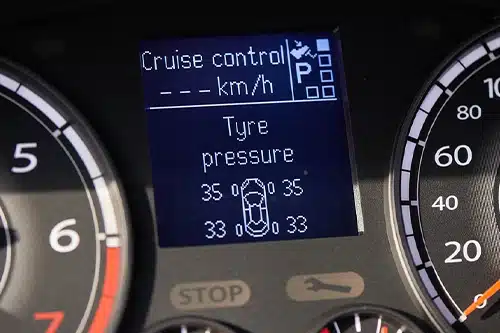Can Cold Weather Cause the TPMS Light to Come On?
As the chilly weather comes your way, you undoubtedly find that your TPMS seems jumpier than normal. Early morning startups, in particular, get the TPMS light flashing brightly, leaving you wondering if something’s up with your tires.
If that’s your reality, then you’ll be glad to know that every 10-degree decrease in temperature drops your tire pressure by up to 2 PSI. But it’s still smart to heed the TPMS warning light, so you can stay safe on the road through the fall car care season and beyond.
To get started, use this guide on what to do when the TPMS light on but tires are fine. Here’s what you need to know.
Why Low Temps Change Your Tire Pressure
As the name implies, the tire pressure monitoring system (TPMS) turns its corresponding dash light on whenever your tire pressure gets too low. Since frigid temps cause tire pressure to decrease, the TPMS light turns on more often than normal through the cold season.
Despite the decrease in pressure, there’s not actually less air in your tires. Instead, the cold weather causes the air to condense and take up less room in the tire. The tire pressure monitoring sensor then triggers the TPMS light as it detects a marked drop in the PSI levels.
Once you start moving down the road, the air inside your tires will warm up and expand to their prior pressure levels. The TPMS light will then turn off, letting you know that your tires are properly inflated.
What to Do When Your TPMS Light Comes On
Since your TPMS light is all about keeping you safe, you should never ignore its warnings. Even when it’s cold outside, it’s wise to use a manual or digital pressure gauge to check all of your tires. The pressure levels should be within 5 to 10 PSI of the normal range. If not, do not drive your vehicle.
You can carefully travel to your next destination if the pressure levels seem reasonable. Keep an eye on the TPMS light and check your pressure levels once again upon arrival. The light should go out within a few minutes of driving. And the pressure levels should normalize by the time you reach your next stop.
If the light stays on or your tires fail to reach the proper PSI, it’s definitely time to take your car into the shop for a thorough inspection. Your Canton CT auto tech will check the function of the pressure sensors, look your tires over for damage, and inflate the tires to the proper level. You can also have them inflate your tires with nitrogen to greatly reduce cold weather pressure changes.
Ready to Schedule Your Visit to Collinsville Auto Repair?
Whenever your TPMS light stays on, you can trust our team at Collinsville Auto Repair to track down the cause. Our auto techs have the skills and experience needed to diagnose and fix the issue the first time around, allowing you to back on the road fast.
So, the next time you wonder, “Why is my TPMS light on still,” simply schedule a visit to our shop with a call to (860) 693-4588. Or you can stop by our shop located at 146 Powder Mill Road, Canton, Connecticut 06019.

